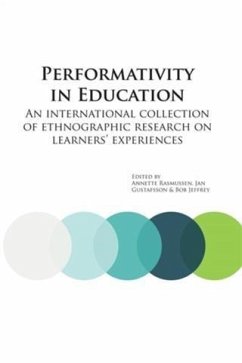
Performativity in UK Education (eBook, ePUB)
Ethnographic Cases of Its Effects, Agency and Reconstructions

PAYBACK Punkte
4 °P sammeln!
Performativity is underpinned by major social and educational policies intended to improve national economic status and social well being. This is a market based approach that encourages performance-based activity and the generation of a culture of performativity. In performative performance the technologies of power are the public league tables, targets and inspection reports that regulate practice, perceived by teachers to be high stakes due to the potential for judgments to be made about the quality of teaching and whether a school is successful or not. They are devices for changing the mea...
Performativity is underpinned by major social and educational policies intended to improve national economic status and social well being. This is a market based approach that encourages performance-based activity and the generation of a culture of performativity. In performative performance the technologies of power are the public league tables, targets and inspection reports that regulate practice, perceived by teachers to be high stakes due to the potential for judgments to be made about the quality of teaching and whether a school is successful or not. They are devices for changing the meaning of practice and of social relationships, providing a new language, a new set of incentives and disciplines, and a new set of roles, positions and identities within which what it means to be a teacher, student and parent are all changed. The operation of this technology of power (performativity) uses rationalised means to normalise individuals showing how assessing one's own teaching quality through performativity testing can bring about new confidence, even to new entrants. Continual improvement is a major feature of current testing and a major element of a performativity text that helps sustain its power and force. Targets are not only met with final celebrations of a job well done but all target completion is met with another exhortation to continually improve, the individual, teacher, class and school performance (see Perryman in this volume). This is the heart of the performativity policy text, the power that circulates to the capillaries, in this case, educational practice. Professional assessments by teachers are used by auditors such as the LA and Ofsted in a critical mode exhorting them to improve upon them. Our first theme focuses on how research itself is influenced by the performativity discourse and our second upon examples of direct effects of performativity via inspections and testing upon school policymaking, practice and professional accommodation. The tension involved in the maintenance of professional values, in a context of performativity, is then examined in our third theme and the fourth theme of agency in performative cultures is then portrayed in two primary schools, Further Education and youth centres outside mainstream education.
Dieser Download kann aus rechtlichen Gründen nur mit Rechnungsadresse in A, B, BG, CY, CZ, D, DK, EW, E, FIN, F, GR, HR, H, IRL, I, LT, L, LR, M, NL, PL, P, R, S, SLO, SK ausgeliefert werden.













